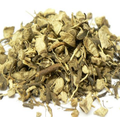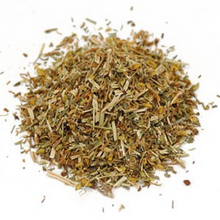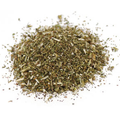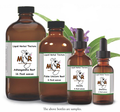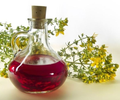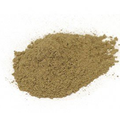 Loading... Please wait...
Loading... Please wait...- Home
- Bulk Herbs
- Herbs (S)
- St. John's Wort
- Home
- Herbs - Organically Grown & Wild Crafted USA
- R S T
- St. John's Wort
St. John's Wort
Product Description
St. John's Wort
Also Known As – Hypericum perforatum, Perforated bush, Hypericum, and Klamath weed.
Wild Crafted - Europe
Overview - St Johns Wort is a small plant with yellow flowers native to Europe. Its common name refers to St. John's Day, which is June 24 and the usual time of year when the flowers are ready for harvest. This herb has been introduced to many other places in the world, and has been labeled as a noxious weed in many places. It can cause severe side effects in livestock that eat it like photosensitization, depression of the central nervous system, spontaneous abortion and death. This herb is also grown commercially in Europe. Use of St. John's wort as medicine dates all the way back to ancient Greece. Historically, it has also been used as an abortifacient.
Medicinal Uses - Internally, St Johns Wort is widely used to treat depression. It has been found very useful for mild depression and to treat children and adolescents, but studies show that it is not strong enough to help severe depression. It may also relieve anxiety. St. John's Wort may also decrease the intake of alcohol. Externally, St. John's Wort also helps nerve pain and can be applied topically to painful areas in a cream or salve. This herb can also be used to treat dermatitis.
- Some people use this herb to treat obsessive-compulsive disorder. It is also useful for peri-menopausal symptoms and premenstrual syndrome. Other disorders that may be helped by this herb include seasonal affective disorder (SAD), HIV and somatoform disorders.
Other Uses – St. John's wort is sometimes used to flavor distilled spirits. The flowers and stems also produce yellow and red dye.
Parts Used - The dried flowering tops and leaf.
Precautions - St Johns wort may cause photosensitivity, so don't stay out in the sun any longer than necessary when you take this herb.
- St. John's wort may interact with antidepressants, birth control pills, cyclosporine, digoxin, indinavir and other drugs used for HIV, irinotecan and other cancer drugs, and warfarin and other anticoagulants. When combined with other antidepressants, you may experience side effects like anxiety, headache, nausea and confusion.
- Some people may be allergic to St. John's wort. It should only be used during pregnancy and nursing with caution and the guidance of a skilled practitioner.
Preparation and Dosage - Traditionally used as a tea, sometimes available in tea bags; also used to make a red St. John’s oil for use in liniments and lotions, but only from fresh material. May also be administered as a capsule or tincture for convenience.
Disclaimer - These products are not intended to diagnose, treat cure or prevent any disease. Reviews are not intended as a substitute for appropriate medical care or the advice of a physician or another medical professional. Actual results may vary among users. Mountain Maus Remedies LLC makes no warranty or representation, expressed or implied, as to the accuracy or validity of the information contributed by outside product review submissions, and assumes no responsibility or liability regarding the use of such information. The information and statements regarding the dietary supplements have not been evaluated by the Food and Drug Administration. If you have a medical condition or disease, please talk to your health care provider. If you are currently taking a prescription medication, you should work with your health care provider before discontinuing any drug or altering any drug regimen, including augmenting your regimen with any herb or dietary supplements. Do not attempt to self-diagnose any disease or ailment based on the reviews and do not use the information contained herein for diagnosing or treating a health problem or disease. Proper medical care is critical to good health. If you have a health concern or suspect you have an undiagnosed sign or symptom, please consult a physician or health care practitioner.
© Mountain Maus Remedies. All Rights Reserved
Find Similar Products by Tag
Find Similar Products by Category

Product Reviews
-
Saved my flock of chickens

Posted by Rolf Hunt on 11th Sep 2024
I don't normally leave reviews and I'm new to herbal medicine, but coming from the sciences, I can testify that I used this St. John's Wort to save our flock of chickens from Marek's disease, which normally kills completely. Use 500-750 mg per adult bird daily for a few days, then back off to every other day for a week, etc. As Marek's never really leaves a location, we give some with feed once a month. Grind some with mortar and pestle and use a little molasses to mix with feed.
-
St. John's Wort

Posted by Tammy on 17th Dec 2021
The quality of this product and all I have ordered from Mountain Maus has been outstanding. I will continue to order from them.


